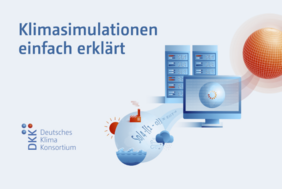Germany wants to become climate-neutral by 2045, according to the revised Climate Change Act. The EU wants to emit at least 55 percent fewer greenhouse gases by 2030, and a large number of measures will be adopted in July to achieve this. The basis for these policy decisions and the implementation of effective measures are based on the findings of climate research. “Climate models clearly show the link between greenhouse gas emissions by mankind and the warming of the earth,” says Professor Mojib Latif, initiator of the new website. “As researchers, it is important for us to emphasize that our climate change projections are not based on speculation, but on scientific laws. That´s why any climate protection measure is only worth as much as its concrete contribution to a rapid reduction in greenhouse gases. Physics is not negotiable,” Prof Latif continues.
How are climate models developed and applied? What can we learn from climate models, and what can we not? These and more questions are answered by the first article on the topic on the new DKK website. The three renowned climate simulation experts from the scientific federation — Dr Johann Jungclaus, Prof Mojib Latif, Prof Gerrit Lohmann — explain in simple terms the basic principles of climate modelling.
The new report of the Intergovernmental Panel on Climate Change (IPCC) will be published in August 2021, and climate models play a crucial role in it. In order to better understand their validity, the DKK has launched this website. Shortly after the IPCC report is published, the new findings will be addressed in a second article.
Press release by Deutsches Klima-Konsortium, 22 June 2021
About Deutsches Klima-Konsortium
The Deutsches Klima-Konsortium (DKK) is a scientific federation and represents the leading players of German climate and climate impact research, encompassing universities, non-university research institutions and federal authorities. In total, more than 4,000 scientists in the foundation´s 25 research organisations conduct research on climate. The DKK stands for science-based policy advice, addresses current issues and provides background information from the perspective of experts.
Further information:
Deutsches Klima-Konsortium
Read more - more information on climate simulations and the IPCC reports is available from the member institutions and directly from the IPCC.
Contact:
Dr Johann Jungclaus
Max Planck Institute for Meteorology
Phone: +49 40 41173 109
Email: johann.jungclaus@mpimet.mpg.de
Elisabeth Weidinger
DKK, Press and Public Information Officer
Phone: +49 30 76771869-4 | +49 176 72780941
Email: elisabeth.weidinger@klima-konsortium.de

